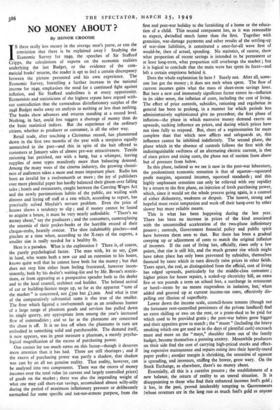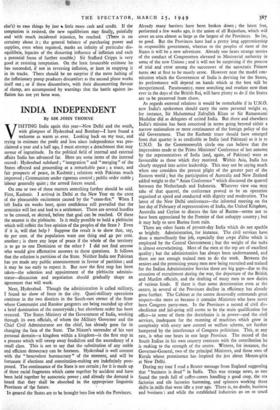NO MONEY ABOUT ?
By HONOR CROOME
IS there really less money in the average man's purse, or can the conviction that there is be explained away ? Studying the Economic Survey for 5949, the speeches of Sir Stafford Cripps, the calculations of experts on the economic realities underlying the last Budget, or the evidence of the com-
mercial banks' returns, the reader is apt to feel a certain discrepancy between the picture presented and his own experience. The Economic Survey, foretelling a further increase in the national income for 1949, emphasises the need for a continued fight against inflation, and Sir Stafford underlines it at every. opportunity. Economists and statisticians of the highest repute have argued with- out contradiction that the tremendous disinflationary surplus of the 1948 Budget melts away on analysis to nothing or less than nothing. The banks show advances and returns standing at a •record level.
Nothing, in fact, could less suggest a shortage of money than do the basic statistical indices. But the experience of the ordinary citizen, whether as producer or consumer, is all the other way.
Retail trade, after touching a Christmas record, has plummeted down in the first two months of the year with a steepness equally unmatched in the past—and this in spite of the bait offered to customers at January sales of almost pre-war attractiveness. Textile rationing has perished, not with a bang, but a whimper, leaving supplies of most types manifestly more than balancing demand. Among the many woes of the cinema industry, the growing choosi- ness of audiences takes a more and more important place. Radio has been an invalid for a twelvemonth or more ; the joy of publishers over more plentiful paper has hardly balanced their gloom over falling sales ; hotels and restaurants, caught between the Catering Wages Act and the newly parsimonious habits of the public, are wailing with distress and laying off staff at a rate which, according to report, has practically solved Mayfair's servant problem. Even the price of houses shows a tendency to slip ; and if money cannot be found to acquire a house, it must be very nearly unfindable. " There's no money about," say the producers ; and the consumers, contemplating the anaemia of their pocket-books or the horrible record of their cheque-stubs, heartily concur. The shoe indubitably pinches—and pinches at a time when, according to the X-rays of the experts, a smaller size is really needed for a healthy fit.
Here is a paradox. What is the explanation ? There is, of course, the purely psychological factor. The man with, let us say, £5oo in hand, who wants both a new car and an extension to his house, knows quite well that he cannot have both for the money ; but that does not stop him either from feeling frustrated, however incon- sistently, both by his dealer's waiting-list and by Mr. Bevan's restric- tions, or from appearing as a prospective spender both to the dealer and to the local council, architect and builder. The belated arrival of car or building-licence mops up, so far as the apparent " tone of the market " is concerned, not £5oo but £1,000. And what is true of the comparatively substantial sums is also true of the smaller. The fiver which figured a twelvemonth ago as an assiduous hunter of a large range of phantom goods and services has pulled down its single quarry, any appropriate item among the year's increased flow of commodities ; and so far as the phantoms are concerned the chase is off. It is no less off when the phantoms in turn are embodied in something solid and purchaseable. The demand itself, it now appears, was in great measure a phantom, a merely psycho- logical magnification of the excess of purchasing power.
One cannot lay too much stress on this factor—though it deserves more attention than it has had. There are still shortages ; and if the excess of purchasing power was partly a shadow, that shadow was cast by an all too genuine reality. That reality, however, can be analysed into two components. There was the excess of money incomes over the total value (at current and largely controlled _prices) of goods on the market ; there was also the impending weight of what one may call short-run savings, accumulated almost willy-nilly during the period of maximum inflationary pressure or deliberately earmarked for some specific and not-too-remote purpose, from the first real post-war holiday to the furnishing of a home or the educa- tion of a child. This second component has, as it was reasonable to expect, dwindled much faster than the first. Together with gratuities, war-damage payments and other results of the settling-up of war-time liabilities, it constituted a once-for-all wave first of would-be, then of actual, spending. No statistics, of course, show what proportion of recent savings is intended to be permanent or at least long-term, what proportion still overhangs the market ; but it is logical to conclude that the main wave has spent its force—and left a certain emptiness behind it.
Does the whole explanation lie here ? Surely not. After all, some- one has got the money ; it does not melt when spent. The flow of current incomes gains what the mass of short-term savings loses.
But here a new and immensely significant factor enters in—inflation in its older sense, the inflation of costs, including the cost of living.
The effect of price controls, subsidies, rationing and regulation in general has been to prolong, in a manner for which periods less administratively sophisticated give no precedent, the first phase of inflation—the phase in which excessive money demand exerts an upwards, sucking influence on prices, and during which prices have not time fully to respond. But, short of a regimentation far more
complete than that which now afflicts and safeguards us, this influence cannot be inhibited indefinitely. The second phase, the phase which in the absence of controls follows the first with the indistinguishable swiftness of an alternating electric current, is that of risen prices and rising costs, the phase not of suction from above but of pressure from below.
In this phase, isolated as we see it now in the post-war laboratory, the predominant economic sensation is that of squeeze—squeezed profit margins, squeezed incomes, squeezed standards ; and this highly unpleasant sensation can only be relieved with any rapidity by a return to the first phase, an injection of fresh purchasing power, which, since it would set the whole process going again, is a counsel of either dishonesty, weakness or despair. The honest, strong and hopeful must resist temptation and work off their hang-over by other slower but more reliable means.
This is what has been happening during the last year. There has been no increase in prices of the kind associated with the uncontrolled acceleration of the two-phase inflationary process ; controls, Government financial policy and public spirit have between them seen to that. But there has been a gradual creeping up or adjustment of costs to match the original inflation of incomes. If the cost of living has, officially, risen only a few points, that rise is still felt, and the much greater rise which might have taken place has only been prevented by subsidies, themselves financed by taxes which in turn directly raise prices in other fields. Taxes apart, the real, as distinguished from the official, cost of living has edged upwards, particularly for the middle-class consumer ; higher prices for house repairs, a scaled-up electricity bill, an extra five or ten pounds a term on school fees, a surcharge in restaurant or hotel—items by no means stupendous in isolation, but; when added and grossed up at current income-tax rates, effectively dis- pelling any illusion of superfluity.
Lower down the income scale, council-house tenants (though not the fortunate rent-controlled pensioners of the private landlord) find an extra shilling or two on the rent, or a pram-shed to be paid for which used to be provided gratis ; the post-war babies grow bigger and their appetites grow to match ; the " musts " (including the heavy smoking which one got used to in the days of plentiful cash) encroach more and more on the " mays," shoulder them out of the family budget, become themselves a pressing anxiety. Meanwhile producers on their side find the cost of carrying high-priced stocks and effect- ing expensive maintenance and repairs eating into their hpavily-taxed paper profits ; anot4er margin is shrinking, the sensation of squeeze is spreading, and investors, sniffing the breeze, grow wary. On the Stock Exchange, as elsewhere, there's no money about.
Essentially, all this is a curative process ; the establishment of a new balance, the return of reality to an unreal situation. It is disappointing to those who find their enhanced incomes fool's gold ; it has, in the past, proved intolerably tempting to Governments (whose revenues are in the long run as much fool's gold as anyone else's) to ease things by just Ix little more cash and credit. If the temptation is resisted, the new equilibrium may finally, painftillY and with much incidental injustice, be reached. (There is no Certainty about it ; the general balance of purchasing power and supplies, even when regained, masks an infinity of particular dis- equilibria, legacies of the distorting influence of inflation and each a potential focus of further trouble.) Sir Stafford Cripps is very good at resisting temptation. On the least favourable estimate he has succeeded, if not in reversing inflation, at least in stopping it in its tracks.. There should be no surprise if the mere halting of the inflationary pump produces discomfort as the second phase works itself out ; or if these discomforts, with their disconcerting flavour of slump, are accompanied by warnings that the battle against in- flation has not yet been won.















































 Previous page
Previous page